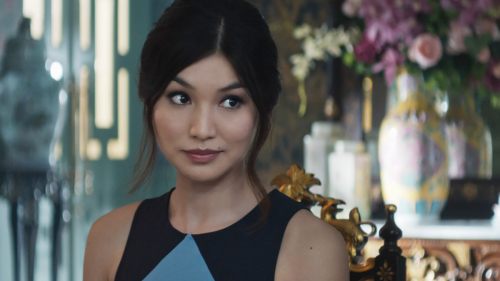CRAZY RICH ASIANS Review: A Beautifully Romantic Summer Vacation
Observant readers may remember that I don't much care for Kevin Kwan's novel Crazy Rich Asians. I think Kwan's prose suffers from something of a tone problem, in that he ostensibly wants to decry the classist elitism of the ultra-wealthy Chinese families of Singapore, but he clearly has a salivating fascination with the designer status symbols of that wealth that he can never quite leave alone long enough to hammer that social commentary home. This isn't to say that Crazy Rich Asians needs to be some kind of sociopolitical deconstruction of the world it presents – far from it, the book is clearly meant to be a summer beach read – but that issue always felt like one that would be rectified by translation to the big screen, where the extravagance could be allowed to visually exist without characters and narration rambling at length about how clearly expensive everything is. This might be the biggest reason why director Jon M. Chu's adaptation succeeds so handily, but it's through that difference in medium that the strengths of Kwan's story shine brightest, offering one of the best romantic comedies of recent memory.
To those unfamiliar, the basic set-up of Crazy Rich Asians follows the structure of just about any billionaire boyfriend fantasy. New Yorker Rachel Chu (Constance Wu) agrees to go with her boyfriend Nick Young (Henry Golding) to meet his family in Singapore, only to quickly discover that among the Chinese elite the Youngs are old money celebrities, and that her modest working-class upbringing doesn't compare to the life that Nick describes as "comfortable." The reason Nick wants to return to Singapore now is to serve as the best man in his friend Colin's (Chris Pang) wedding, so in the whirlwind of preparing for the festivities, Rachel must navigate the perilous social gauntlet of jealous bachelorettes, unfamiliar customs, vicious social politicking, and the disapproval of Nick's mother, Eleanor (Michelle Yeoh).
What makes Crazy Rich Asians stand out amongst a multitude of similar stories of middle-class wonder at wealthy excess is… well, just how explicitly Asian everything is. Jon M. Chu is throwing as much stylistic flourish as he can while still keeping his love story emotionally grounded, shooting Singapore with an equal adoration for the natural landscape and the urban upper-class splendor of the wealthy estates. Text message exchanges are represented with majestic digital ribbons flying through the air, Western influence on the upper crust's homes, clothing, and jewelry is equally countered by Chinese traditionalism, and the cultural allusions in dialogue and the film's visual language are rooted in terms explicitly meant to speak to Asian and Asian American audiences. It's utterly refreshing to see an American film that embraces Chinese ethnocentrism, something unheard of in mainstream American cinema in literal decades.
That cultural significance likely wouldn't mean much without a charming cast to carry us through, and luckily everyone is bringing their A-game to this embrace of spectacle. Constance Wu is a charismatic lead, providing a grounded audience point of view while still investing the role with a sense of self-determination and willfulness that goes beyond mere plot tourism. Henry Golding fills the role of hunky, almost too-perfect boyfriend with aplomb, but the showstealer is Awkwafina as Rachel's best friend Peik Lin, with an abrasive awkward eccentricity that is effortlessly and consistently hilarious. But if we're going to point to one star among the many talented Asian American actors on display – with all due apologies to Gemma Chan, Lisa Lu, Ken Jeong, Nico Santos, and many, many others – it has to be Michelle Yeoh embodying the complex soul of Eleanor Young. Eleanor exists at the intersection of genuine care for her son's well-being and despising the individualism American living has instilled within him, making her less of a clichéd mother-in-law villain than an antagonist driven by a perceived threat to her culture and a desire for her son to have a better life than hers. Yeoh conveys these whirling emotions with a mask of resolve that only cracks under extreme duress, and the resulting nuance in her performance is magnetic.
But as enjoyable as this cast and production are, the script doesn't quite escape some of the structural problems with Kwan's narrative. A subplot with Rachel's mom feels just as superfluous here as in the original text, even if it is thankfully truncated for time, and there are numerous other subplots that arguably exist to flesh out the maneuvering social network of the Youngs' world but ultimately feel tangential. The biggest offender revolves around Nick's cousin Astrid (Gemma Chan) and her marital troubles, which in the novel serve as a fleshed out reflection of Rachel's journey but is here obligatory set-up for potential sequels that never quite gets its due, either in terms of thematic resonance or in allowing Astrid's character to fully develop.
Even so, Crazy Rich Asians is a bombastic achievement of the romantic comedy genre, reveling in its excess without beating you over the head with it. The heart of the story is in these characters, and for as much as Jon M. Chu understands the appeal of creating a virtual vacation through the power of film, he recognizes that our enjoyment of such a vacation is based on who we spend it with, and these are characters I genuinely want to spend more time with. Considering how disinterested in I was in reading the book's sequels, take that as very high praise indeed.



